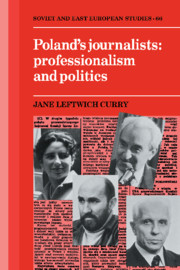Book contents
- Frontmatter
- Contents
- Acknowledgments
- 1 Journalists as professionals in theory and reality
- 2 The postwar roots of the profession
- 3 Living and learning journalism
- 4 Professional associations and professional politics
- 5 Journalists as political actors
- 6 Solidarity and beyond: the critical test of professionals and professionality
- Appendix: Research methodology: unwritten answers
- Notes
- Select bibliography
- Index
- Soviet and East European Studies
2 - The postwar roots of the profession
Published online by Cambridge University Press: 30 September 2009
- Frontmatter
- Contents
- Acknowledgments
- 1 Journalists as professionals in theory and reality
- 2 The postwar roots of the profession
- 3 Living and learning journalism
- 4 Professional associations and professional politics
- 5 Journalists as political actors
- 6 Solidarity and beyond: the critical test of professionals and professionality
- Appendix: Research methodology: unwritten answers
- Notes
- Select bibliography
- Index
- Soviet and East European Studies
Summary
The end of World War II and the imposition of communist rule marked the beginnings of what seemed to be a new Polish journalism profession. Few of Poland's cadre of prewar journalists remained at the end of the war. And, most of those who had survived were summarily blacklisted or pushed to the side by the time communist rule was established in late 1947. In their place came a deluge of young men and women for whom journalism and the new communist rule offered a chance “to make it.”
The destruction of World War II had left Poland without the basics for a press. Paper, ink, and printing presses were simply not available. And, most skilled and experienced journalists had been killed; had escaped to the West; or had gone into hiding, publishing only under pseudonyms. The prewar Polish press had been outlawed by the Germans and the press that came out during the war, with the exception of a few Polish language papers controlled by the Germans, came from the communist and noncommunist undergrounds. All that remained were memories of the prewar traditions of the press as an independent voice against unwelcome rulers and a forum for intellectual discussion. These traditions fit the realities of a Poland partitioned between three empires and the time of freedom that followed World War I, only to be worn down by a military regime.
- Type
- Chapter
- Information
- Poland's JournalistsProfessionalism and Politics, pp. 35 - 72Publisher: Cambridge University PressPrint publication year: 1990



